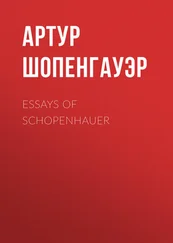Артур Шопенгауэр - The Essays of Arthur Schopenhauer; The Art of Literature
Здесь есть возможность читать онлайн «Артур Шопенгауэр - The Essays of Arthur Schopenhauer; The Art of Literature» — ознакомительный отрывок электронной книги совершенно бесплатно, а после прочтения отрывка купить полную версию. В некоторых случаях можно слушать аудио, скачать через торрент в формате fb2 и присутствует краткое содержание. Жанр: Философия, literature_19, foreign_antique, foreign_prose, на английском языке. Описание произведения, (предисловие) а так же отзывы посетителей доступны на портале библиотеки ЛибКат.
- Название:The Essays of Arthur Schopenhauer; The Art of Literature
- Автор:
- Жанр:
- Год:неизвестен
- ISBN:нет данных
- Рейтинг книги:3 / 5. Голосов: 1
-
Избранное:Добавить в избранное
- Отзывы:
-
Ваша оценка:
- 60
- 1
- 2
- 3
- 4
- 5
The Essays of Arthur Schopenhauer; The Art of Literature: краткое содержание, описание и аннотация
Предлагаем к чтению аннотацию, описание, краткое содержание или предисловие (зависит от того, что написал сам автор книги «The Essays of Arthur Schopenhauer; The Art of Literature»). Если вы не нашли необходимую информацию о книге — напишите в комментариях, мы постараемся отыскать её.
The Essays of Arthur Schopenhauer; The Art of Literature — читать онлайн ознакомительный отрывок
Ниже представлен текст книги, разбитый по страницам. Система сохранения места последней прочитанной страницы, позволяет с удобством читать онлайн бесплатно книгу «The Essays of Arthur Schopenhauer; The Art of Literature», без необходимости каждый раз заново искать на чём Вы остановились. Поставьте закладку, и сможете в любой момент перейти на страницу, на которой закончили чтение.
Интервал:
Закладка:
On the other hand, a good author, fertile in ideas, soon wins his reader's confidence that, when he writes, he has really and truly something to say ; and this gives the intelligent reader patience to follow him with attention. Such an author, just because he really has something to say, will never fail to express himself in the simplest and most straightforward manner; because his object is to awake the very same thought in the reader that he has in himself, and no other. So he will be able to affirm with Boileau that his thoughts are everywhere open to the light of the day, and that his verse always says something, whether it says it well or ill:
Ma pensée au grand jour partout s'offre et s'expose, Et mon vers, bien ou mal, dit toujours quelque chose:
while of the writers previously described it may be asserted, in the words of the same poet, that they talk much and never say anything at all — quiparlant beaucoup ne disent jamais rien .
Another characteristic of such writers is that they always avoid a positive assertion wherever they can possibly do so, in order to leave a loophole for escape in case of need. Hence they never fail to choose the more abstract way of expressing themselves; whereas intelligent people use the more concrete ; because the latter brings things more within the range of actual demonstration, which is the source of all evidence.
There are many examples proving this preference for abstract expression; and a particularly ridiculous one is afforded by the use of the verb to condition in the sense of to cause or to produce . People say to condition something instead of to cause it , because being abstract and indefinite it says less; it affirms that A cannot happen without B , instead of that A is caused by B . A back door is always left open; and this suits people whose secret knowledge of their own incapacity inspires them with a perpetual terror of all positive assertion; while with other people it is merely the effect of that tendency by which everything that is stupid in literature or bad in life is immediately imitated – a fact proved in either case by the rapid way in which it spreads. The Englishman uses his own judgment in what he writes as well as in what he does; but there is no nation of which this eulogy is less true than of the Germans. The consequence of this state of things is that the word cause has of late almost disappeared from the language of literature, and people talk only of condition . The fact is worth mentioning because it is so characteristically ridiculous.
The very fact that these commonplace authors are never more than half-conscious when they write, would be enough to account for their dullness of mind and the tedious things they produce. I say they are only half-conscious, because they really do not themselves understand the meaning of the words they use: they take words ready-made and commit them to memory. Hence when they write, it is not so much words as whole phrases that they put together — phrases banales . This is the explanation of that palpable lack of clearly-expressed thought in what they say. The fact is that they do not possess the die to give this stamp to their writing; clear thought of their own is just what they have not got. And what do we find in its place? – a vague, enigmatical intermixture of words, current phrases, hackneyed terms, and fashionable expressions. The result is that the foggy stuff they write is like a page printed with very old type.
On the other hand, an intelligent author really speaks to us when he writes, and that is why he is able to rouse our interest and commune with us. It is the intelligent author alone who puts individual words together with a full consciousness of their meaning, and chooses them with deliberate design. Consequently, his discourse stands to that of the writer described above, much as a picture that has been really painted, to one that has been produced by the use of a stencil. In the one case, every word, every touch of the brush, has a special purpose; in the other, all is done mechanically. The same distinction may be observed in music. For just as Lichtenberg says that Garrick's soul seemed to be in every muscle in his body, so it is the omnipresence of intellect that always and everywhere characterizes the work of genius.
I have alluded to the tediousness which marks the works of these writers; and in this connection it is to be observed, generally, that tediousness is of two kinds; objective and subjective. A work is objectively tedious when it contains the defect in question; that is to say, when its author has no perfectly clear thought or knowledge to communicate. For if a man has any clear thought or knowledge in him, his aim will be to communicate it, and he will direct his energies to this end; so that the ideas he furnishes are everywhere clearly expressed. The result is that he is neither diffuse, nor unmeaning, nor confused, and consequently not tedious. In such a case, even though the author is at bottom in error, the error is at any rate clearly worked out and well thought over, so that it is at least formally correct; and thus some value always attaches to the work. But for the same reason a work that is objectively tedious is at all times devoid of any value whatever.
The other kind of tediousness is only relative: a reader may find a work dull because he has no interest in the question treated of in it, and this means that his intellect is restricted. The best work may, therefore, be tedious subjectively, tedious, I mean, to this or that particular person; just as, contrarity, the worst work may be subjectively engrossing to this or that particular person who has an interest in the question treated of, or in the writer of the book.
It would generally serve writers in good stead if they would see that, whilst a man should, if possible, think like a great genius, he should talk the same language as everyone else. Authors should use common words to say uncommon things. But they do just the opposite. We find them trying to wrap up trivial ideas in grand words, and to clothe their very ordinary thoughts in the most extraordinary phrases, the most far-fetched, unnatural, and out-of-the-way expressions. Their sentences perpetually stalk about on stilts. They take so much pleasure in bombast, and write in such a high-flown, bloated, affected, hyperbolical and acrobatic style that their prototype is Ancient Pistol, whom his friend Falstaff once impatiently told to say what he had to say like a man of this world. 3 3 King Henry IV ., Part II. Act v. Sc. 3.
There is no expression in any other language exactly answering to the French stile empesé ; but the thing itself exists all the more often. When associated with affectation, it is in literature what assumption of dignity, grand airs and primeness are in society; and equally intolerable. Dullness of mind is fond of donning this dress; just as an ordinary life it is stupid people who like being demure and formal.
An author who writes in the prim style resembles a man who dresses himself up in order to avoid being confounded or put on the same level with a mob – a risk never run by the gentleman , even in his worst clothes. The plebeian may be known by a certain showiness of attire and a wish to have everything spick and span; and in the same way, the commonplace person is betrayed by his style.
Nevertheless, an author follows a false aim if he tries to write exactly as he speaks. There is no style of writing but should have a certain trace of kinship with the epigraphic or monumental style, which is, indeed, the ancestor of all styles. For an author to write as he speaks is just as reprehensible as the opposite fault, to speak as he writes; for this gives a pedantic effect to what he says, and at the same time makes him hardly intelligible.
Читать дальшеИнтервал:
Закладка:
Похожие книги на «The Essays of Arthur Schopenhauer; The Art of Literature»
Представляем Вашему вниманию похожие книги на «The Essays of Arthur Schopenhauer; The Art of Literature» списком для выбора. Мы отобрали схожую по названию и смыслу литературу в надежде предоставить читателям больше вариантов отыскать новые, интересные, ещё непрочитанные произведения.
Обсуждение, отзывы о книге «The Essays of Arthur Schopenhauer; The Art of Literature» и просто собственные мнения читателей. Оставьте ваши комментарии, напишите, что Вы думаете о произведении, его смысле или главных героях. Укажите что конкретно понравилось, а что нет, и почему Вы так считаете.












